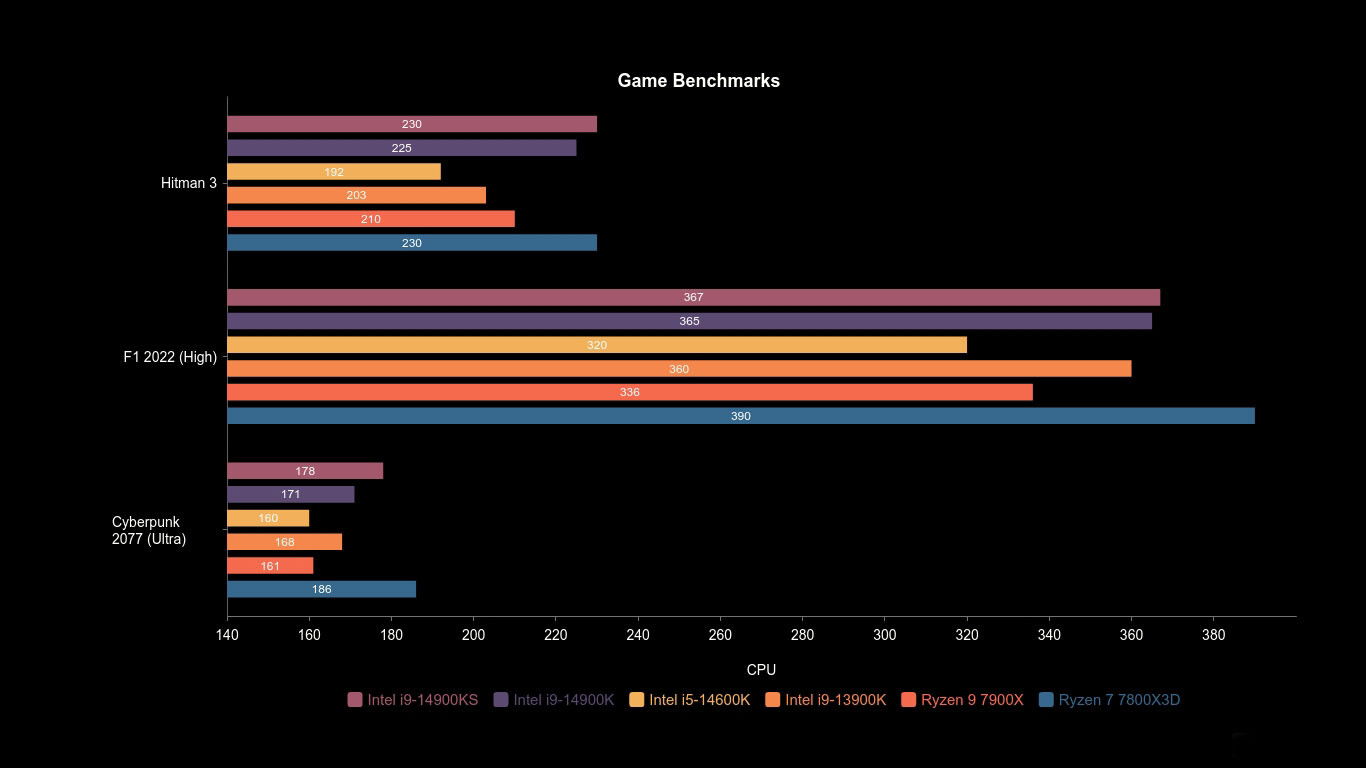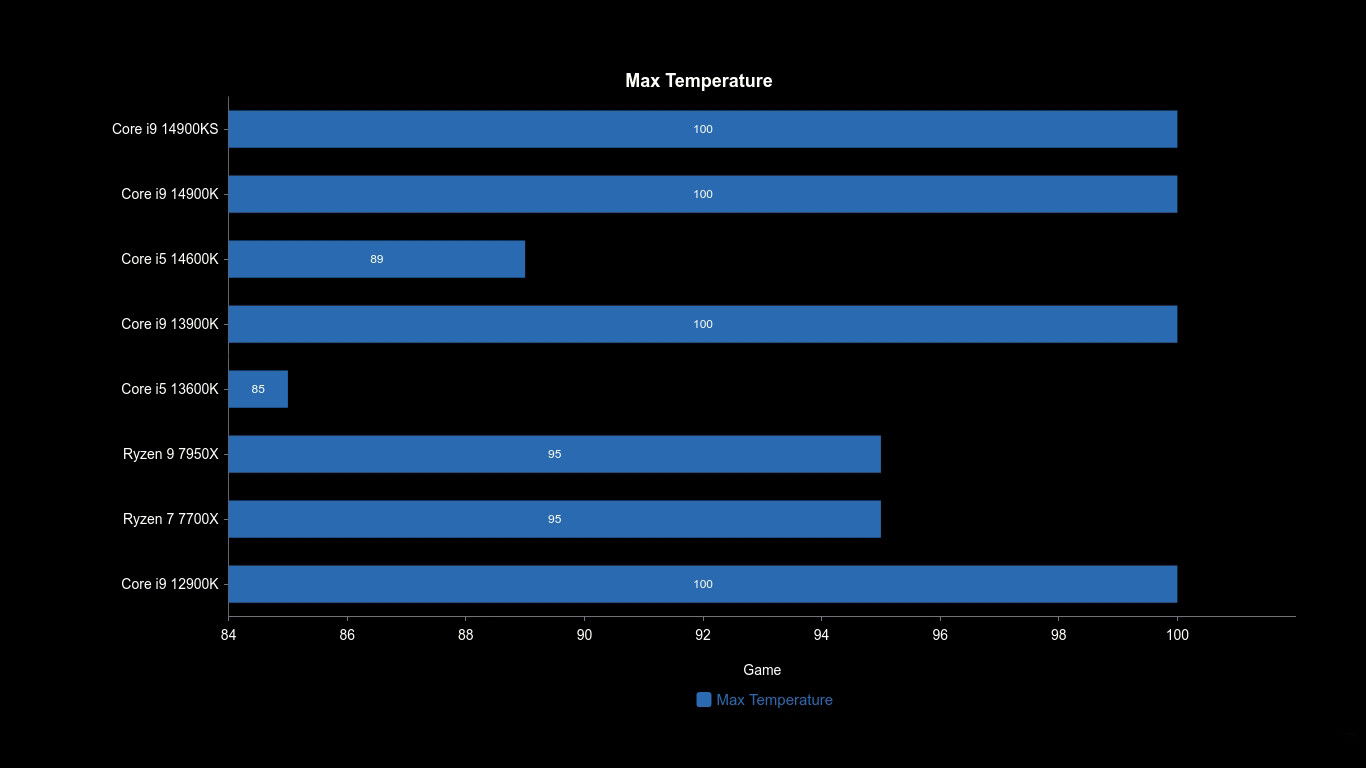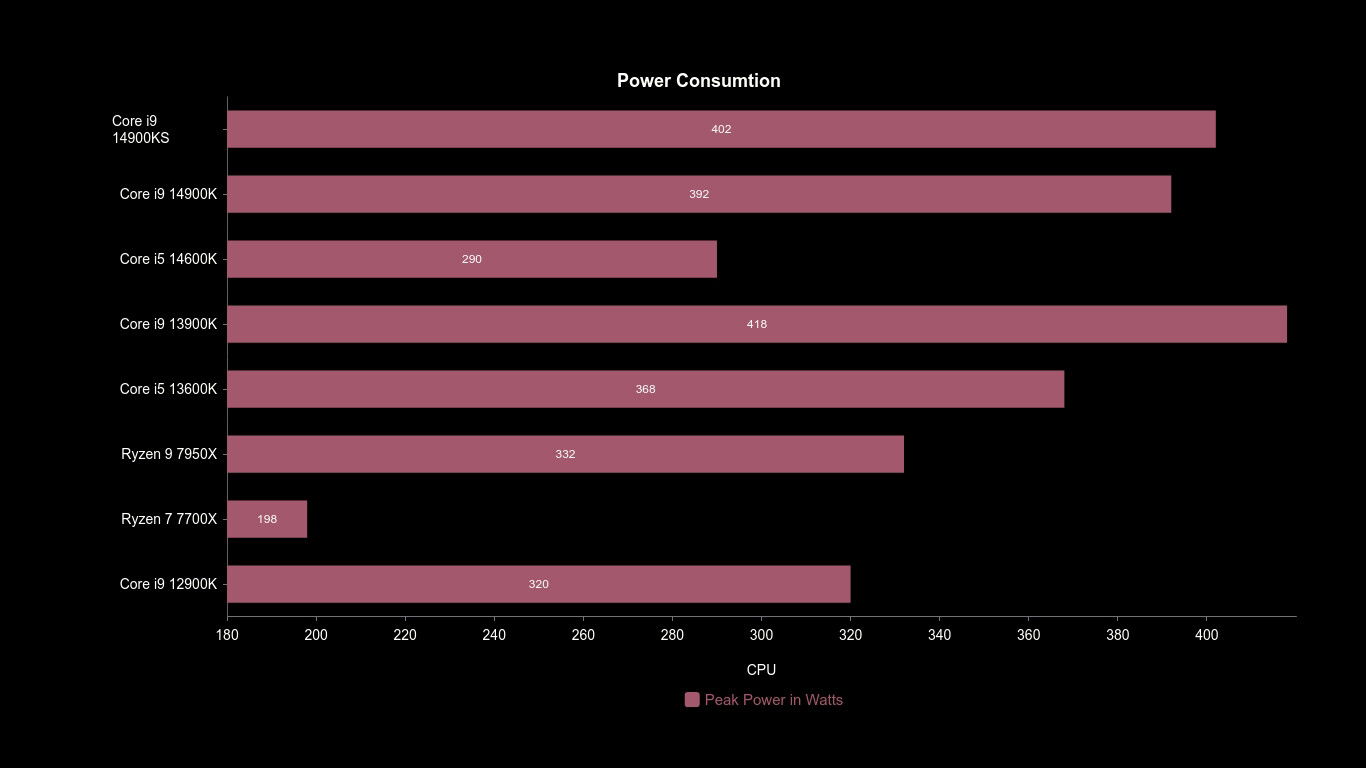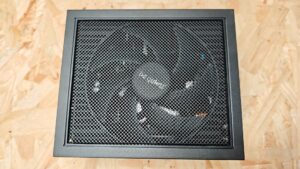Summer’s here, and people are already looking to build a new rig for back to school. With that in mind, we thought it was time to take a look at the flagship Intel Core i9-14900KS CPU and see how it stacks up. This special edition CPU pushes the clock speeds to new heights and aims to take back the performance crown from AMD. Don’t get me wrong, this is a powerful CPU that pushes the boundaries of what you can expect from a PC, but it comes at a price that the average PC buyer may not need.
Specs & What’s New
I looked at the Intel Core i9-14900K when it first hit the shelves, but the 14900KS is a little different and worth a look to see if it is worth the premium price. The Core i9-14900KS CPU is based on Intel’s Raptor Lake Refresh architecture, with 24 cores (8 P-cores and 16 E-cores) and 32 threads. What sets it apart is its blistering 6.2GHz maximum turbo speed across two cores, the highest stock clock speed ever for a consumer desktop CPU.

With similar overall specifications, this chip is essentially a highly binned version of the standard 14900K. Intel selects the best silicon that can reach these high frequencies at reasonable voltages. The Intel Core i9-14900KS CPU has a base clock of 3.2 GHz on the P-cores and 2.4 GHz on the E-cores. It has 36MB of L3 cache and supports up to 192GB of DDR5-5600 or DDR4-3200 memory.
“The Intel Core i9-14900KS CPU has a base clock of 3.2 GHz on the P-cores and 2.4 GHz on the E-cores.”
A key difference is power consumption. While the standard 14900K has a base power rating of 125W (PL1), the KS bumps this up to 150W. The maximum turbo power (PL2) remains 253W on paper, but in practice, the 14900KS can draw significantly more power when pushed to the limit. This all sounds like it was built to perform, and we will get to that, but as I said, it comes at a price; it can draw a lot of power and get hot. There are benefits to what this type of CPU can do, but as much as I think it is a marvel of engineering, it may not be for everyone.

Productivity Performance
To keep things consistent with our previous reviews of the Intel 14-generation family, we put the Intel Core i9-14900KS on our latest bench to get things started. For the motherboard, I chose the ASUS ROG Maximus Z790 Dark Hero due to its robust power delivery and extensive overclocking options. To feed the CPU’s appetite for power, I used an NZXT 360 AIO cooler, similar to the one we tested in our recent AMD test builds. I also paired the CPU with 64GB of DDR5 and an SK Hynix SSD to keep things running as smoothly as possible for testing.

When it comes to testing productivity and content creation workloads, the 14900KS delivers modest gains over its non-K sibling. Thanks to those sky-high clock speeds, single-threaded performance sees the biggest boost. In Cinebench R23 single-core, the 14900KS scored around 3-4% higher than the 14900K, and that makes a lot of sense. With a boost clock of 6.2 GHz, it is a force to be reckoned with.
“In Cinebench R23 single-core, the 14900KS scored around 3-4% higher than the 14900K, and that makes a lot of sense. With a boost clock of 6.2 GHz, it is a force to be reckoned with.”
Multi-threaded performance improvements are less dramatic, typically in the 1-3% range compared to the 14900K. This makes sense, given the similar core counts and performance limits. The 14900KS does shine in certain rendering tasks, with gains of 5-7% in benchmarks in selected tests. Although I expected a bit more, the 14900K was already a solid CPU, so it makes sense that the extra horsepower can only do so much.
It’s worth noting that many content-creation applications don’t take full advantage of extreme core counts and clock speeds. In Adobe Premiere Pro, for example, the 14900KS was only about 2% faster than the 14900K. Creative professionals may be better served by a more balanced chip like the Core i5-13600K or Ryzen 7 7700X.
However, as software develops to take advantage of the features and speed of the offer, this could change. Especially with new workflows being used constantly, it’s hard to say whether the 14900KS will get better as new versions of software come out. It will still crunch through whatever you need, just not as drastically as the specs might suggest.
Gaming Performance
Gaming is where the Intel Core i9-14900KS really flexes its muscles. These stratospheric clock rates translate into the highest frame rates we’ve seen from a CPU in many titles. At 1080p with a high-end GPU, the 14900KS outperformed the 14900K by an average of 2-5%, depending on the game. The strongest performance came from Hitman 3. As with the 14900K, the CPU is rarely the bottleneck, so even with the gains seen, it is only marginally better than a new GPU that can have a massive impact.

At higher resolutions, the GPU becomes the limiting factor, and the CPU differences shrink. At 4K, there was often no measurable difference between the 14900KS and other high-end chips. For most gamers, a more modest CPU paired with a top-of-the-range GPU will deliver similar real-world performance at a fraction of the cost.
“Gaming is where the Intel Core i9-14900KS really flexes its muscles.”
Looking at Cyberpunk 2077, one of the more demanding games we tested, the new generation showed little difference, with only a slight increase from the 14900K to its newer counterpart, the i9-14900KS—something that most people will not notice. Even with the potential power offered by the KS chip, the Intel Core i5-14600K remains a viable option for gamers, especially for average players, delivering solid performance relative to its power consumption.
Breaking it all down, the Intel Core i9-14900KS is a beast, but only a selection of titles can truly take advantage of what it offers. In many titles, the 14900KS outperforms AMD’s gaming-focused 3D V-cache chips, such as the Ryzen 7 7800X3D. However, the differences are usually small, and AMD still has the edge in some games that benefit from its massive L3 cache.
Power Draw and Thermals
Let’s not bury the lead; the Intel Core i9-14900KS gets warm and draws a lot of power. While Intel lists a 253W maximum turbo power, the 14900KS can draw far more in practice. Under heavy multi-core loads, power consumption regularly exceeded 300W in testing. Some extreme scenarios saw a power draw spike of over 400W. That is higher than any other CPU we have tested up to this point and over 20W higher than what we saw on the 14900K.

All that power generates significant heat. Even with high-end liquid cooling, the 14900KS can hit thermal limits in sustained workloads. This causes clock speeds to fluctuate as the chip tries to balance performance and temperatures. This is why you need a powerful cooling system to get the 14900KS to sustain the performance it has on offer. When the CPU can hit close to 100C, the stock fan you can buy for $30 simply will not do.
You will also need a motherboard that can handle the potential power consumption of the 14900KS. While it will theoretically run on any board that meets the specifications, if you want to see what the system can do, you need to make sure it can get the power from the PSU to the CPU without causing problems. Cheap motherboards have to cut costs somewhere, and that is often in the power delivery or features on offer. But the reality is that if you are spending top dollar on your CPU, you cannot skimp on the motherboard or PSU, or you will run into problems.
Power consumption also has an impact on efficiency. While the 14900KS may be 3-5% faster than the 14900K in some tests, it often consumes 10-15% more power to achieve these gains. For users concerned about energy costs or running a quiet system, the standard 14900K or even the 14700K may be a more sensible option. It’s clear that Intel has pushed Raptor Lake to the absolute limit with this chip. While impressive from a technical standpoint, the 14900KS is dangerously close to the point of diminishing returns.

Pricing and Value
At $749, the Core i9-14900KS costs $100 more than the standard 14900K. That’s a hefty price to pay for what amounts to a single-digit performance gain in most scenarios. For gaming, it’s hard to justify the cost unless you’re chasing every frame at competitive 1080p settings. Content creators will probably get better value from a Ryzen 9 7950X or even a previous-generation Intel chip. The 14900KS feels more like a halo product for enthusiasts and overclockers than a practical choice for most users.
This may sound harsh, but I am actually impressed by how powerful the 14900KS really is. This is a ridiculously powerful CPU that shows just how good Intel is at producing some of the best chips in the world. To put it bluntly, if you simply want the fastest consumer desktop CPU money can buy, regardless of price or power consumption, the Intel Core i9-14900KS CPU delivers.

It beats AMD’s best in many benchmarks and takes the overall gaming performance crown, albeit narrowly. There are real scenarios in content creation where the 14900KS can be a fantastic option, but for the price and performance it delivers, the average person has many more options that are less demanding on their power or system to achieve similar results.
The Core i9-14900KS is the pinnacle of Intel’s 14th-generation range, pushing frequencies to new heights. For a select group of enthusiasts, it offers bragging rights as the fastest CPU on the market. Gaming performance is undeniably impressive, especially in CPU-bound scenarios. But for the majority of users, the standard 14900K or even the 13900K offer almost identical real-world performance at a lower price.
The 14900K’s extreme power consumption and thermal output limit its appeal outside of heavily cooled enthusiast rigs. For the vast majority of users, more balanced options such as the Core i7-14700K or Ryzen 7 7700X will deliver excellent performance without thermal and power compromises. The 14900KS stands as a testament to what’s possible with modern CPU design, even if it’s not the most practical choice for mainstream buyers.
- Game without compromise. Play harder and work smarter with Intel Core 14th Gen processors
- 24 cores (8 P-cores + 16 E-cores) and 32 threads. Integrated Intel UHD Graphics 770 included







